|

by Geoffrey Pohanka
July 2013
from
IsThereGlobalCooling Website
I will
try to give you the answer to the question: "is there global
cooling?"
As you
are well aware there is a huge effort around the globe to counter
the alleged impact of mankind on the world's climate. If in fact
mankind will cause the seas to rise appreciably by causing CO2
induced global warming then certainly let's do something about it.
But,
what if global warming is not what they say it is? What if the
world's temperature is headed in the opposite direction?
Global
temperatures increased for twenty years from the late 1970s to the
late 1990s but have either stopped warming or have begun to cool in
the last fifteen years. The global warming and subsequent cooling
were even predictable due to hundreds of years of historical trends
and observation of the impact of variations in solar activity on
global temperature.
Did you
know that in the past
the Roman Period and
Medieval Period were both
several degrees warmer than today's temperature?
The
world then cooled at least four degrees from approx. 1450 to 1850.
This period was called the
Little Ice Age (a period of glacial
advance, the same glaciers that have been in retreat until
recently).
These temperature variations
were not caused by man.
They
were caused entirely by natural forces.
Quick facts about the...
U.S. and Global Climate,
Global Cooling News
U.S. and global Temperatures are
not warming
-
March '12 - Oregon
and Washington break all time March snowfall record
link. Bering Sea has second largest March ice extent on
record
link.
Record breaking March cold in Tasmania Australia
link. Huge snowfall in China kills 90,000 livestock and
impacts 25,000 people
link. First quarter 2012 was very warm in the USA
link.
Over 15,000 Records Broken as March 2012
Becomes Warmest on Record
-
April '12
-
Sydney, coldest day in 80 years
link. May '12
UK on track for coldest May in 200 years
link.
-
June '12
-
Sweden has one of the coldest Junes since records began in
1789
link. Rare cold in New Zealand
link. Argentina agrigulture frosts lead to crisis
link. Seattle has third coldest June in history
link.
-
July '12
- climate emergency in Argentina due to cold, a dozen
freeze to death in Chile. Tasmania has record low
temperatures
link. August '12
South Africa, snows in all 9 provinces for first time in
recorded history
link. September '12
Antarctic sea ice extent is largest ever recorded for this
day, eighth highest record in history
link.
Antarctica sea ice
area is the largest ever recorded on Sept 12, 2012
link.
-
October '12
-
Earliest snow in Australia in a century
link. Record cold grips part of Australia
link. Surprise October snow hits central Germany
link. Heavy snow catches Muscovites unprepared
link. For only the second time in recorded history do
all the provinces of Austria have snow in October
link.
-
Nov '12 - early
cold snap kills 14 in Poland
link. Hurricane Sandy causes record snowfall in
Appalachians
link. Three tourists die from cold on Great Wall of
China from early snow
link.
Winter hits early on three continents, global
cooling?
link. Northeast USA has record snowfall
link.
Record snow around USA
link. Globe to be seized by record cold, UK faces coldest
Winter in 100 years, Arctic sees record refreeze, snow in
New Zealand
link. Connecting the global cooling dots
link.
-
Dec '12
-
Russians near Moscos trapped for days on highway during
snowstorm
link, back-up over 125 miles long
link. UK has coldest Autumn since 1993
link. European deef freeze killing hundreds.
link.
Record snow in Norway, signs of global cooling?
link. Record snow in Minneapolis
link. State of emergency declared in Ukraine due to huge
snows, more global cooling?
link. 37 dead in 24 hours in Ukraine freeze
link.
Russia faces strongest winter in decades, -50°C
temperatures, people freezing to death
link. Severe global cooling grips Eastern Europe, over
600 die from cold, state of emergency declared in Siberia
link.
Dozens die in Polish global cooling snap
link. -61 deg F in Siberian global cooling
link. Massive cold front grips Asia
link
North India cold wave kills 25
link. Brutally cold Russian winter claims 125 lives, so
far
link. Coldest Russian Winter in decades, snow up to 16
feet deep
link. US has the most snow cover in ten years
link.
December 2012 had the largest Northern Hemisphere snow cover
extent ever recorded
link.
-
January '13
-
Asia gripped with record cold, hundreds dead. Bangladesh has
coldest temperatures since 1960s
link. Russia burried under snow
link. 29 die from cold in Mexico
link. Bermuda has record daily low temperature
link. Over 300 die from brutal cold in Eastern Europe
link.
-
February '13
-
New England snow could be one for the record books
link. German winter temperatures are dropping at a rate
of 6°C per century
link. Alps cooling since 2000 (peer reviewed literature)
link. Record New England snows
link.
Heaviest snowfall in a Century hits Moscow
link.
Northern Hemisphere has all time low temperature
link. Japan has worst Winter snow in history
link. Last 4 out of 5 Winters were cooler than normal
link. Germany has darkest Winter in 43 years
link.
-
March '13
-
Calcutta has coldest day in 100 years, record low
temperatures
link. Winter 2012-2013 November-February ranked 4th
largest for snow in history, #2 for Northern hemisphere,
December '12 had most snow ever
link.
UK in deep freeze, deaths from cold mounting
link. Arctic sea ice largest in a decade
link. UK faxes gas rationing as shortages mount with
coldest weather in 50 years
link. UK cold chaos
link. Second coldest March in USA since 1969
link. Berlin has coldest March in 100 years. gripped by
cold
link.
UK coldest Spring since 1963, claims 5,000 lives
link. Germany
coldest Spring on-record
link. Germany has late March temp of -33°C,
coldest temperature in over 100 years
link. Climate models fail to predict brutally cold
European temperatures
link.
Thousands of animals buried alive in Ireland by snow drifts
link.
-
April '13
- Russian scientists say Earth will cool until 2050 and
temperatures will decline 1.5°C
link. Baltic sea ice sets record for month of March
link. Saskatchewan has coldest Spring in a century
link. 40,000 livestock killed by snow in Ireland
link.
-
May '13 - First
May snow in Arkansas ever recorded
link. Record snow storm hits Midwest
link. Antarctic sea ice sets all time record ice extent
for this day
link. Ice break up at Nenana Ice Classic in Alaska sets
latest date in 97 years of records
link.
Record late snow hits Newfoundland
link. Northern Hemisphere snow cover sets record for
November-April time period
link. UK headed towards coldest spring in 30 years
link.
Northeast USA gets up to 36 inches of snow during
Memorial Day, Syracuse and Binghamton NY have latest snow on
record
link. Geramany has coldest Spring since 1970
link. 79% of USA temperatures are below average first
five months of 2013
link.
Alaska has longest snow season on record
link. Vermont has latest snow since 1897
link.
-
June '13
-
French ski resort on Spanish border to open in June for
first time in history
link. Coldest Spring in UK since 1891
link. Capetown South Africa, earliest snow in many years
causes emergency to be declared
link.
Europeans reacting to cool European summer weather, chance
of surface frost in Germany for late June
link. 33,000 sheep and cattle stranded in New Zealand
deep snow
link.
-
July '13
-
Extraordinary cold hits southern third of South America
link. Chinese wheat crops are devastated by cold and wet
weather
link. Heavy snows batter New Zealand
link. Global cooling sweeps through southern half of
South America
link. First major snow hits Buenos Aires since 1918
link. Record low temperatures in Chile
link.
The best and most accurate way to measure global temperatures are
from satellites that measure atmospheric temperatures. See how
atmospheric temperatures have changed since the start of measurement
in 1979
link.
Though the 2011/12 Winter temperatures
were warm in the U.S. global temps were the 11th coolest in 32 years
of satellite measurement
link.
Total
global polar sea ice extent is largely unchanged over the past 30
years
When adding the sea ice volumes at both
poles there is about the same ice as 30 years ago:
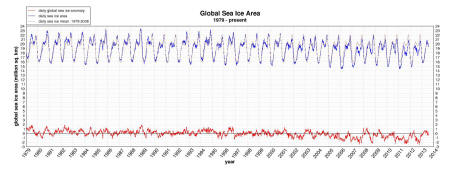
Antarctica has 90% of the world's ice and had the most sea
ice ever recorded at the end of 2008, over one million square
kilometers above the average maximum.
The global sea ice extent
today (combined sea ice at both Poles) is nearly the same as the
average of the last 30 years according to NASA and NSIDC:
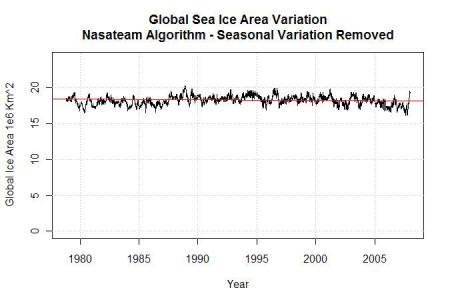

View today's Antarctic sea ice extent compared to the
1979-2007 average (National Snow and Ice Data Center):

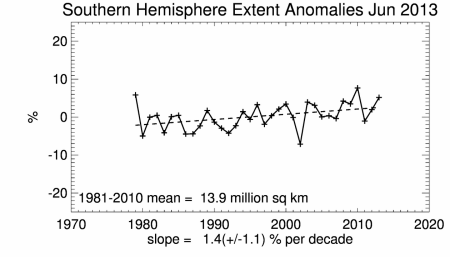
A strong storm in the Arctic during the
late Summer of 2012 caused the Arctic ice area to shrink to a record
low yet the ice is now expanding at a fast rate. The Bering Sea off
Alaska in 2012 had the most ice area ever recorded
link.
The Antarctic sea ice extent in September 2009 is also
growing and is 1 million square kilometers more than the previous
year. In September 2012 Antarctica had the largest sea ice extent
ever recorded
link.
View today's Arctic sea ice extent, NSIDC
(below image), DMI
link.
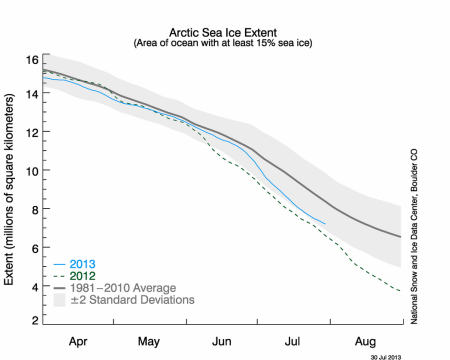
View today's Antarctic sea ice extent Univ. Illinois Cryosphere
(below image). 2010 Antarctic ice extent was the third
largest ever recorded. Average snowfall in Antarctica was the most
ever recorded
link.
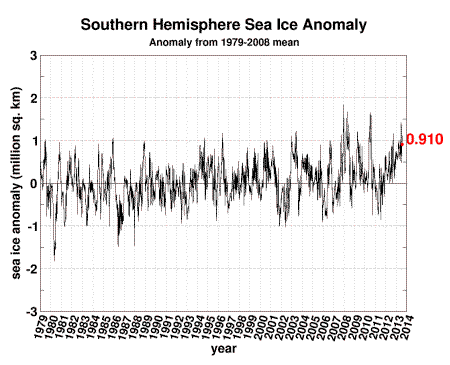
See current ice conditions in the
Northern Hemisphere
and the Southern Hemisphere:
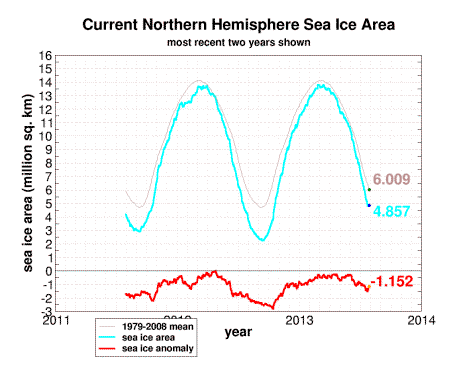

Find out what really impact Arctic sea ice melting
link.
Ocean temperatures are cooling
NSIDC/NASA AMSR-E also shows that
the overall trend of ocean temperatures since 2002 is one of
cooling in spite of a recent short lived El Niņo warming event:

The oceans have been cooling which
is contrary to climate model predictions:
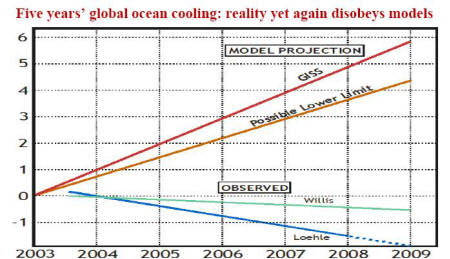
See how Argo is measuring ocean temperatures throughout
the globe
link.
Argo research (with its 3,300 ocean buoys) has
found ocean temperatures are cooler
link.
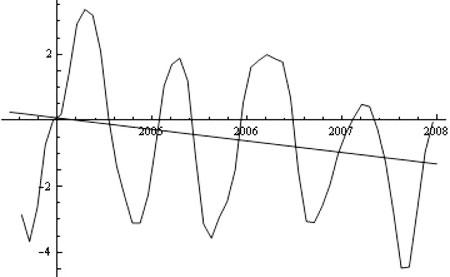
The PDO (Pacific) is moving towards
a cool period (La Niņa). See current ocean surface temperatures
from the NOAA
link,
link
Track mid Atlantic storm formation
here, NOAA
link.
Global storms and their intensity are in decline
The trend for violent tornadoes is in
decline in the US:
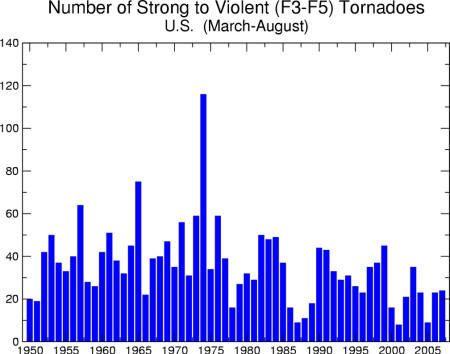
U.S. landfall hurricanes are less numerous and powerful
than decades ago. Global hurricane, typhoon, and cyclone activity
are nearing 50 year lows according to Florida State University
link.
Deaths from severe weather events are in decline:
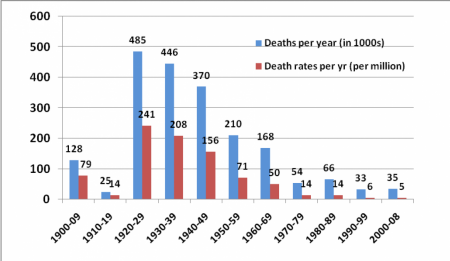
Global cyclone activity is at 33 year
lows at the end of the 2010 hurricane season. Pacific storms lowest
since recording began in 1945
link.
There have been few hurricanes to reach
US shores in the past three years which is highly unusual
link. The U.S. went over 1,000 days in a row without a single
hurricane strike.
Global hurricane (tornado) activity in
2010 was at the lowest level in three decades even though 2010 was a
warm year overall
link.
U.S. tornado activity in 2012 was at the
lowest level ever recorded according to NOAA
link,
link,
link.
Polar Bear populations are of record size
Some say Polar Bears are threatened but
there are more polar bears today than ever recorded, an increase of
300%+ since the 1950s
link,
link
The scientific name for Polar bears is
Ursus Maritimus,
which means sea bear. Polar Bears are excellent swimmers and can
swim 200 miles or more
link.
A Polar Bear with a radio tracking collar swam over 400
miles in 9 days and without rest
link. Polar bears have survived periods when the Arctic melted
completely in the past (they moved to land).
Polar bear face bright
future
link.
Solar activity is in decline. This has led to cooler
temperatures in the past
Polar ice is growing. Storm intensity is
in decline.
One reason may be that solar activity is at the lowest
level in almost a Century
link,
link.
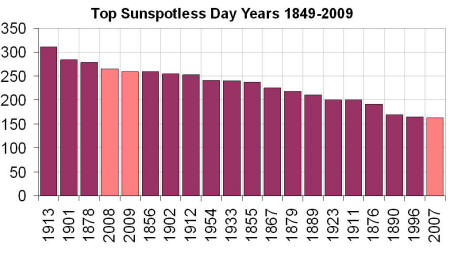
See what the sun looks like with and without sunspots:
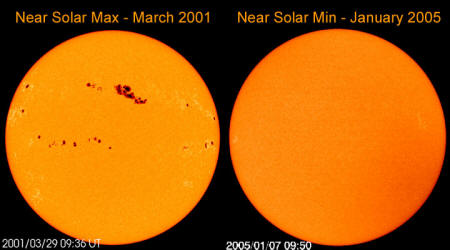
In the past periods with fewer sunspots and lower solar
activity were ones with cooler temperatures.
It is believed by some
scientists that lower solar activity increases cloud formation and
this has a cooling effect. If the past is a predictor of the
future, these changes in solar activity will cause a 30 year period
of cooling temperatures on earth and in fact it appears that this
has already begun.
See solar activity charts here
link.
See the combined impact of ocean and
solar cycles on global temperatures:
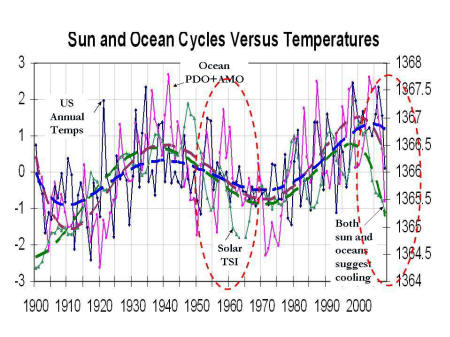
NASA recently announced that due to the
expected multi decade continuation of low solar activity that global
temperatures should continue to cool.
How much will rising CO2
levels offset this? If the past is a predictor of the future, not
much.
Europe,
North America and many other areas of the Earth have recently
experienced a score of unusually low temperatures.
-
So where is the
global warming that we are preparing for?
-
Does anyone really think
global warming causes global cooling?
-
Is a
carbon cap and trade system that would raise hundreds of
billions of dollars each year for the government necessary if in
fact the slightly warmer temperatures of 1978-1998 were caused by
natural forces such as the Sun's increased activity in that period,
and that many scientists are now becoming skeptical of the theory of
man made global warming (AGW)? link.
-
Is the re-engineering of society to reduce CO2 emissions necessary
when in the geological history of the planet warming temperatures
were never preceeded by rising CO2 levels?
-
Did you know that if this
country eliminates 100% of its CO2 emissions China will replace it
within in 2 years due to their high growth rate?
It appears to me that the man made global warming
theory is looking more and more like
the Y2K 'scare'
of the late
1990s.
|

















